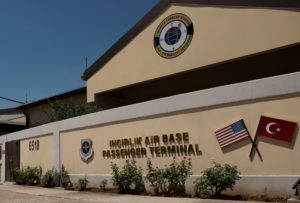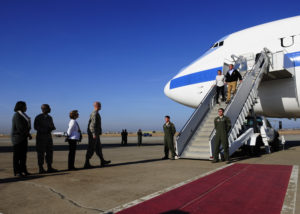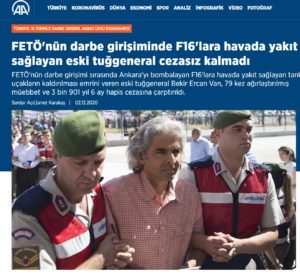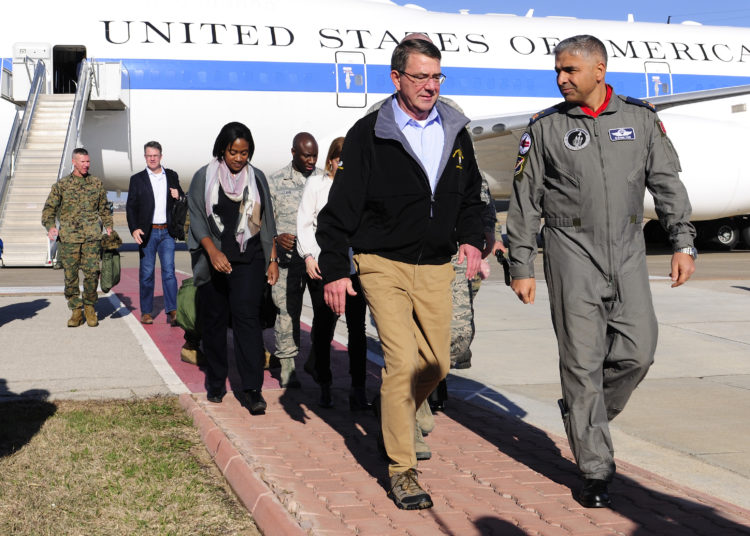Abdullah Bozkurt/Stockholm
Turkish authorities secretly investigated the US secretary of defense, Pentagon officials, US diplomats, German generals and NATO military leaders and diplomats in Turkey because they visited Incirlik Air Base in southern Adana province, according to confidential documents that were obtained by Nordic Monitor.
The shocking list of dozens of senior foreign officials who were targeted by Turkish authorities as part of a criminal investigation into a 2016 coup attempt was discovered among the documents in case file No.2016/46625-16. The officials were red flagged by the Adana Chief Public Prosecutor’s Office because they visited the commander of the base, Staff Lt. Gen. Bekir Ercan Van, between July 2015 and July 2016.
The document listing the visits was submitted to Musa Unel, deputy chief public prosecutor in Adana, on July 30, 2016 by Brig. Gen. Kemal Turan, the deputy commander of Incirlik Air Base.
The wide net cast by prosecutors in the investigation into the attempted coup that involved Incirlik looked more like a fishing expedition and appears to have been designed to help feed into the false narrative of the government of President Recep Tayyip Erdoğan, which claimed that the US was the mastermind behind the abortive putsch, although there has been no evidence presented to support that claim.
Among the names included in the investigation file were that of Timothy M. Ray, a US Air Force general who was commander of the 3rd Air Force at Ramstein Air Base, Germany, when he visited Incirlik on July 31, 2015. He currently serves as commander of the Air Force Global Strike Command. His second visit to Incirlik took place on December 1, 2015.
The secret list of foreign visitors to Incirlik Air Base, where they met with the base’s Turkish commander, was entered as evidence in a criminal case in Turkey:
Brig. Gen. R. Bob Bruce, then-deputy commander of Combined Joint Task Force Operation Inherent Resolve (CJTF-OIR), a US-led military campaign against the Islamic State in Iraq and Syria (ISIS), was also on the list. His visit to Incirlik Air Base on August 8, 2015 was part of a routine trip because Turkey had given expanded access to US coalition partners since 2015, albeit reluctantly, and after lengthy negotiations between the government of President Erdoğan and the Barack Obama administration, to use Turkish bases in the anti-ISIS campaign.
US Army Lt. Gen. Michael K. Nagata, who is now retired, was also investigated because he was at Incirlik Air Base at the same time as Lt. Gen. Bruce. Nagata was commander of Special Operations Command Central and in charge of the US train and equip program for rebels in Syria. He worked closely with Turkey on training militants, but the program was eventually cancelled when Turkish intelligence agency MIT tried to enlist radical jihadist figures, attempting to pass them off as moderates. The initial screening of volunteers was made by MIT and final vetting by the CIA. The training and equipment was provided by the Turkish and US militaries.
The Turkish prosecutor focused on US Consul General Linda S. Specht’s visit to the Incirlik Air Base commander on August 27, 2015 as well. The Turkish government was not able to pursue charges against any US diplomats, but it ran a defamation campaign against the US ambassador in Ankara and eventually went after long-time local employees of the Adana and Istanbul consulates on fabricated terrorism charges.
The Erdoğan government in 2017 orchestrated the arrest of Metin Topuz, who had been working at the US Consulate General in Istanbul since 1982. Topuz moved to the Drug Enforcement Agency at the consulate in 1993 and served as a liaison between Turkish police and the DEA. The Turkish government built a sham case to convict Topuz on fabricated charges of terrorism in June 2020. He was sentenced to eight years, nine months in prison on charges the US government said lacked credible evidence.

Hamza Uluçay, who had been working as a translator at the consulate in Adana for 36 years, was arrested in February 2017 and sentenced to four-and-a-half years in prison in January 2019.
Maj. Gen. Barre R. Seguin, deputy chief of staff, Strategic Employment, Supreme Headquarters Allied Powers Europe in Belgium, was at the base on August 31, 2015. He was the commander of the 31st Fighter Wing, Aviano Air Base, Italy, when he met with Turkish commander Van. Philip Mark Breedlove, a retired US Air Force general, came to Turkey in September 2015 when he was serving as commander of the 17th Supreme Allied Commander Europe (SACEUR) of NATO Allied Command Operations. Marc Henrys Sasseville, a US Air Force lieutenant general who currently serves as the 12th vice chief of the National Guard Bureau, met with Turkish Gen. Van on October 21, 2015. At the time, he was serving as the senior defense official/defense attaché at the US European Command.
Herbert Jay “Hawk” Carlisle, a retired US Air Force general who visited Incirlik Air Base on October 23, 2015 when he was commander of the Air Combat Command at Langley Air Force Base in Virginia, was also on the list.
Christine Elizabeth Wormuth, the US secretary of the army, was in the crosshairs of Turkish prosecutors because she visited the Turkish base in Adana on November 16, 2015 when she was under secretary of defense for policy, specializing in counterterrorism operations and conducting talks with allies on defense ties with Europe, Asia and the Middle East.
Secret document that showed the list of top foreign visitors was sent to the chief public prosecutor’s office in Adana, where Incirlik Air Base is located:
Paul Joseph Selva, a retired US Air Force general, was in Turkey on November 25, 2015. He was vice chairman of the Joint Chiefs of Staff at the time.
Frank Gorenc, a retired US Air Force general, came to Turkey on December 1, 2015 to visit the base as then-commander of US Air Forces in Europe. He was followed by US Maj. Gen. Timothy M. Zadalis, then the vice commander of US Air Forces in Europe-Air Forces Africa, which operates out of Ramstein Air Base in Germany. He met with Turkish Gen. Van on December 14, 2015.
The most senior US official who met with Van during a visit to Incirlik Air Base was then-US Secretary of Defense Ash Carter, who was in Adana on December 15, 2015 accompanied by commander of Special Operations Command Central (SOCCENT) Brig. Gen. Darsie D. Rogers Jr., who was involved with the Combined Joint lnteragency Task Force with respect to Syria. During the visit Carter told reporters that Ankara needed to better control its border with Syria, particularly a section that was used by ISIS for illicit trade and for moving foreign fighters back and forth.
US Army Lt. Gen. Sean Barry MacFarland, now retired, went to Incirlik Air Base on December 21, 2015 to coordinate the anti-ISIS campaign. He was the commander of the coalition against ISIS in Syria and Iraq and responsible for Combined Joint Task Force – Operation Inherent Resolve (CJTF-OIR).
The last US official to visit Van at Incirlik Air Base was Edwin John Deedrick Jr., a US Army lieutenant general who met with Van at the base on July 11, 2016. He was the commander of Special Operations Joint Task Force – Operation Inherent Resolve (SOJTF-OIR).

In addition to American officials, Turkish prosecutors also investigated officials from other NATO nations such as Germany, Slovenia and Spain. For example, German Lt. Gen. Thorsten Poschwatta, the then-deputy commander of the Bundeswehr Joint Forces Operations Command, met with Van on November 29, 2015. Air Force Brig. Gen. Andreas Schick was another senior German military officer who visited Incirlik, on December 12, 2015. He was director of flying operations at the Air Force Command in Cologne, North Rhine-Westphalia. His second visit to Incirlik took place on December 31, 2015.
Lt. Gen. Karl Mullner of the German Air Force Command met with Van on January 19, 2016 followed by a visit by German Ambassador Hardeu Erdmann the next day. German troops were deployed in Turkey as part of the forces contributing to the US-led anti-ISIS operations.
Turkish prosecutors also looked into a Slovenian defense delegation that paid a visit to Incirlik Air Base and met with Van on November 23, 2015. Milan Maxim, Slovenian chief of general staff, Slovenian Brig. Gen. Jindrich Koch and Defense Attaché Jozef Viktorin were listed in the document that was submitted to the Adana Chief Public Prosecutor’s Office.
Spanish Lt. Gen. Ruben C. Garcia Servert was also at Incirlik on January 15, 2016 when he was commander of NATO’s Combined Air Operation Center at Spain’s Torrejón Air Base.
The alleged involvement of the Incirlik base, where troops and military assets of the US and other NATO allies were deployed, in the military mobilization on July 15, 2016 was an important part of the government storyline in the false flag coup, with Turkish officials publicly accusing NATO allies, especially the US, of being behind the putschist attempt. There has been no evidence presented by the government to support accusations that the US and other NATO allies were involved in the military mobilization on that night.

A significant amount of evidence was uncovered during trial proceedings indicating that the putschist attempt was actually cooked up by the Turkish president and his intelligence and military chiefs as part of a long-planned purge of pro-NATO officers from the alliance’s second largest army. Many officers including the commander of Incirlik Air Base were jailed on dubious charges and in the absence of evidence of any wrongdoing.
An investigation of foreign officials who visited Incirlik Air Base and met with Van in a courtesy call was conducted by Turkish prosecutors with a total disregard for due process and due diligence and reflected the rapid slide of Turkey away from its NATO allies.
Nordic Monitor previously published government documents confirming that US troops and contractors were investigated by Turkish prosecutors in multiple provinces over meetings and assignments that were not related to the coup.
On one occasion a Turkish prosecutor launched a criminal investigation into US officials and American defense contractor Lockheed Martin representatives over meetings on July 12-13 that dealt with part of a modernization program for Turkish F-16 fighter jets.
The allegations that the US was involved in the attempt were made publicly by Turkish government officials at various times. Interior Minister Suleyman Soylu accused the US of orchestrating the coup on July 16 while events were still unfolding. He repeated the same allegation on a number of occasions, saying that vocal Erdoğan critic Fethullah Gülen lacked the capability of mounting such an attempt.
The government accuses Gülen, a 79-year-old cleric who has been living in the US since 1999, of being behind the failed coup although no evidence has been presented to prove the claim. Gülen himself denied playing any role and asked for an international inquiry to ascertain the real perpetrators, a proposal that Erdoğan declined.
Turkish government officials have raised the possibility of denying US troops an access to İncirlik Air Base amid growing differences with the US on a number of issues including the Erdoğan government’s purchase of long-range missiles from Russia and Turkish military operations in Syria and the eastern Mediterranean.
In January 2018 Turkish Foreign Minister Mevlüt Çavuşoğlu said on government TV network TRT that he had delivered to then-Secretary of State Rex Tillerson the Turkish people’s demands regarding İncirlik during a meeting in Vancouver. In July 2018 Erdoğan for the first time raised the issue of closing İncirlik Air Base to the Americans, followed by similar comments from his neo-nationalist ally Doğu Perinçek.
With the unprecedented purge of over 4,000 judges and prosecutors and their replacement by partisan, Islamist and neo-nationalist candidates in 2016, Turkish prosecutors and judges are seen as political whips in the hands of the government, which often abuses the criminal justice system to intimidate critics at home and convey political messages to foreign governments.
Many believe the limited military mobilization in 2016 was a false flag operation orchestrated by Erdoğan himself to consolidate power in his hands, push the Turkish military into operations in Syria and Libya and prosecute his opponents on fabricated criminal charges.

In the meantime, Gen. Van was arrested, tried and convicted on coup plotting charges although the case file did not have any evidence that supported prosecutors’ allegations that he was involved. He denied playing any role in the mobilization and defended himself, saying he deployed two tanker planes when he was ordered to help support F-16 jets that were scrambled as part of a counterterrorism operation long before the putschist attempt started.
The third tanker aircraft was deployed again under orders from his superiors to refuel F-16s scrambled to control the airspace at the request of the government in the early hours of July 16. What is more, he allowed the flight of two F-16s that were scrambled to intercept the jets that were alleged to have been involved in the putschist attempt.
“I personally went to the runway and talked to the F-16 pilots through headphones. I asked who they got the order from and what their mission was. I also allowed the F-16s to take off after they said they would intercept the planes involved in the coup. If I were a coup plotter, I would have prevented the planes from taking off from Incirlik Base. It would have been very simple for me to do,” he said in testimony delivered at the Ankara 4th High Criminal Court.
He had been in contact with the governor, police chief and prosecutor’s office all night, told them he had secured the base and did not allow anybody to leave. He refused to accept the assignment that was allegedly sent by putschists appointing him the martial law general in Adana province. Despite the lack of evidence, Van was convicted at the end of a sham trial and sentenced to serve 79 aggravated life sentences and an additional 3,901 years in prison.












